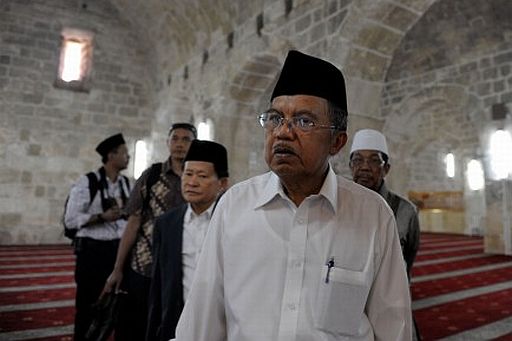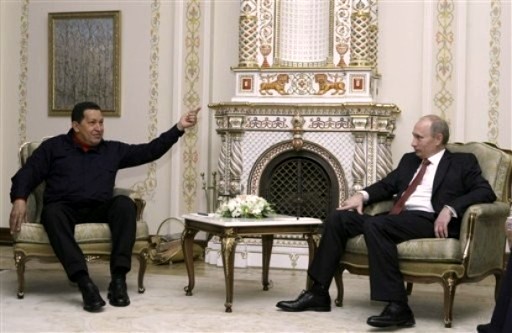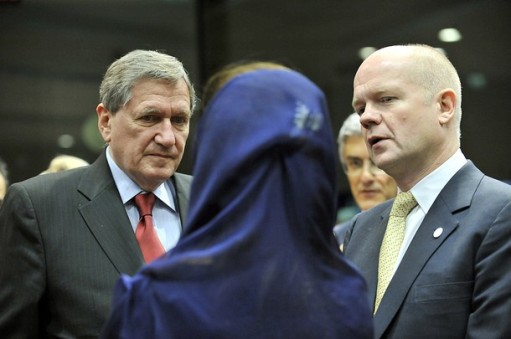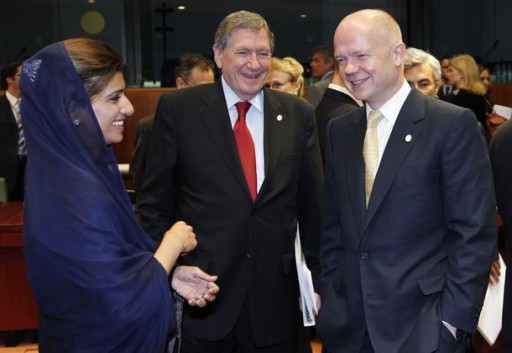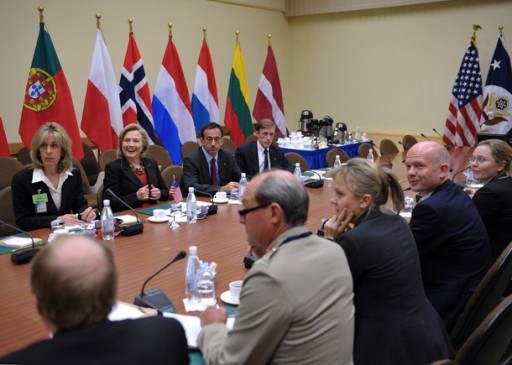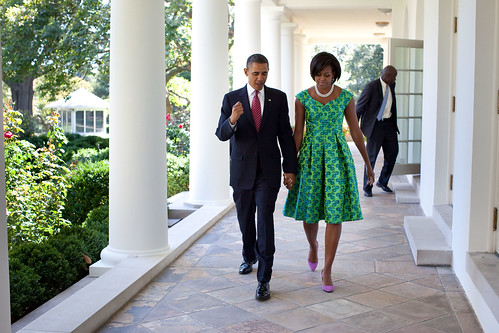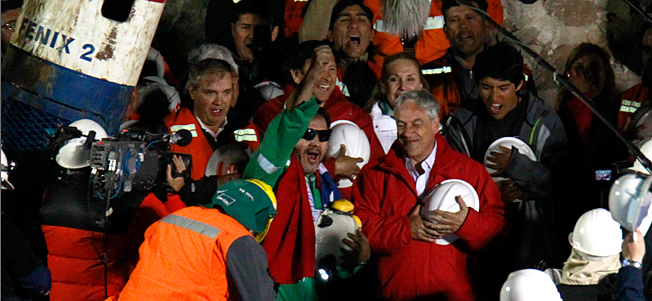 |
Miner Luis Urzua, the last miner to be rescued, celebrates next to Chile's President Sebastian Pinera after being pulled to safety. ( AP/Roberto Candia ) |
SAN JOSE MINE, Chile (KATAKAMI / AP) – The last of the Chilean miners, the foreman who held them together when they were feared lost, was raised from the depths of the earth Wednesday night — a joyous ending to a 69-day ordeal that riveted the world. No one has ever been trapped so long and survived.
Luis Urzua ascended smoothly through 2,000 feet of rock, completing a 22 1/2-hour rescue operation that unfolded with remarkable speed and flawless execution. Before a jubilant crowd of about 2,000 people, he became the 33rd miner to be rescued.
"We have done what the entire world was waiting for," he told Chilean President Sebastian
Pinera immediately after his rescue. "The 70 days that we fought so hard were not in vain. We had strength, we had spirit, we wanted to fight, we wanted to fight for our families, and that was the greatest thing."
The president told him: "You are not the same, and the country is not the same after this. You were an inspiration. Go hug your wife and your daughter." With Urzua by his side, he led the crowd in singing the national anthem.
The rescue exceeded expectations every step of the way. Officials first said it might be four months before they could get the men out; it turned out to be 69 days and about 8 hours.
Once the escape tunnel was finished, they estimated it would take 36 to 48 hours to get all the miners to the surface. That got faster as the operation went along, and all the men were safely above ground in 22 hours, 37 minutes.
The rescue workers who talked the men through the final hours were being hoisted one at time to the surface.
 AP/Hugo Infante, Chilean government
AP/Hugo Infante, Chilean government
The crowd in "Camp Hope," down a hill from the escape shaft, set off confetti, released balloons and sprayed champagne as Urzua's capsule surfaced, joining in a rousing miners' cheer. In Chile's capital of Santiago, hundreds gathered in Plaza Italia, waving flags and chanting victory slogans in the miners' honor.
In nearby Copiapo, about 3,000 people gathered in the town square, where a huge screen broadcast live footage of the rescue. The exuberant crowd waved Chilean flags of all sizes and blew on red vuvuzelas as cars drove around the plaza honking their horns, their drivers yelling, "Long live Chile!"
"The miners are our heroes," said teary-eyed Copiapo resident Maria Guzman, 45.
One by one throughout the day, the men had emerged to the cheers of exuberant Chileans and before the eyes of a transfixed globe. While the operation picked up speed as the day went on, each miner was greeted with the same boisterous applause from rescuers.
"Welcome to life," Pinera told Victor Segovia, the 15th miner out. On a day of superlatives, it seemed no overstatement.
They rejoined a world intensely curious about their ordeal, and certain to offer fame and jobs. Previously unimaginable riches awaited men who had risked their lives going into the unstable gold and
copper mine for about $1,600 a month.
The miners made the smooth ascent inside a capsule called Phoenix — 13 feet tall, barely wider than their shoulders and painted in the white, blue and red of the Chilean flag. It had a door that stuck occasionally, and some wheels had to be replaced, but it worked exactly as planned.
Beginning at midnight Tuesday, and sometimes as quickly as every 25 minutes, the pod was lowered the nearly half-mile to where 700,000 tons of rock collapsed Aug. 5 and entombed the men.
Then, after a quick pep talk from rescue workers who had descended into the mine, a miner would climb in, make the journey upward and emerge from a manhole into the blinding sun.
The rescue was planned with extreme care. The miners were monitored by video on the way up for any sign of panic. They had oxygen masks, dark glasses to protect their eyes from the unfamiliar sunlight and sweaters for the jarring transition from subterranean swelter to chilly desert air.
As they neared the surface, a camera attached to the top of the capsule showed a brilliant white piercing the darkness not unlike what accident survivors describe when they have near-death experiences.
The miners emerged looking healthier than many had expected and even clean-shaven. Several thrust their fists upwards like prizefighters, and Mario Sepulveda, the second to taste freedom, bounded out and led his rescuers in a rousing cheer. Franklin Lobos, who played for the Chilean national soccer team in the 1980s, briefly bounced a soccer ball on his foot and knee.
"We have prayed to San Lorenzo, the patron saint of miners, and to many other saints so that my brothers Florencio and Renan would come out of the mine all right. It is as if they had been born again," said Priscila Avalos. One of her brothers was the first miner rescued, and the other was due out later in the evening.
Health Minister Jaime Manalich said some of the miners probably will be able to leave the hospital Thursday — earlier than projected — but many had been unable to sleep, wanted to talk with families and were anxious. One was treated for pneumonia, and two needed dental work.
"They are not ready to have a moment's rest until the last of their colleagues is out," he said.
As it traveled down and up, down and up, the rescue capsule was not rotating as much inside the 2,041-foot escape shaft as officials expected, allowing for faster trips.
The first man out was Florencio Avalos, who emerged from the missile-like chamber and hugged his sobbing 7-year-old son, his wife and the Chilean president.
No one in recorded history has survived as long trapped underground. For the first 17 days, no one even knew whether they were alive. In the weeks that followed, the world was captivated by their endurance and unity.
News channels from North America to Europe and the Middle East carried live coverage of the rescue. Pope Benedict XVI said in Spanish that he "continues with hope to entrust to God's goodness" the fate of the men. Iran's state English-language Press TV followed events live for a time. Crews from Russia and Japan and North Korean state TV were at the mine.
The images beamed to the world were extraordinary: Grainy footage from beneath the earth showed each miner climbing into capsule, then disappearing upward through an opening. Then a camera showed the pod steadily rising through the dark, smooth-walled tunnel.
Among the first rescued was the youngest miner, Jimmy Sanchez, at 19 the father of a months-old baby. Two hours later came the oldest,
Mario Gomez, 63, who suffers from a lung disease common to miners and had been on antibiotics inside the mine. He dropped to his knees after he emerged, bowed his head in prayer and clutched the Chilean flag.
Gomez's wife, Lilianett Ramirez, pulled him up from the ground and embraced him. The couple had talked over video chat once a week, and she said that he had repeated the promise he made to her in his initial letter from inside the mine: He would marry her properly in a church wedding, followed by the honeymoon they never had.
The lone foreigner among them, Carlos Mamani of Bolivia, was visited at a nearby clinic by Pinera and Bolivian President Evo Morales. The miner could be heard telling the Chilean president how nice it was to breathe fresh air and see the stars.
Most of the men emerged clean-shaven. More than 300 people at the mine alone had worked on the rescue or to sustain them during their long wait by lowering rocket-shaped tubes dubbed "palomas," Spanish for carrier pigeons. Along with the food and medicine came razors and shaving cream.
Estimates for the rescue operation alone have soared beyond $22 million, though the government has repeatedly insisted that money is not a concern.
The men emerged in good health. But at the hospital in Copiapo, where miner after miner walked from the ambulance to a waiting wheelchair, it became clear that psychological issues would be as important to treat as physical ones.
Dr. Guillermo Swett said Sepulveda told him about an internal "fight with the devil" that he had inside the mine. He said Sanchez appeared to be having a hard time adjusting, and seemed depressed.
"He spoke very little and didn't seem to connect," the doctor said.
The entire rescue operation was meticulously choreographed. No expense was spared in bringing in topflight drillers and equipment — and boring three separate holes into the copper and gold mine. Only one has been finished — the one through which the miners exited.
Mining is Chile's lifeblood, providing 40 percent of state earnings, and Pinera put his mining minister and the operations chief of state-owned Codelco, the country's biggest company, in charge of the rescue.
It went so well that its managers abandoned a plan to restrict images of the rescue. A huge Chilean flag that was to obscure the hole from view was moved aside so the hundreds of cameras perched on a hill above could record images that state TV also fed live.
That included the surreal moment when the capsule dropped for the first time into the chamber, where the bare-chested miners, most stripped down to shorts because of the underground heat, mobbed the rescuer who emerged to serve as their guide to freedom.
"This rescue operation has been so marvelous, so clean, so emotional that there was no reason not to allow the eyes of the world — which have been watching this operation so closely — to see it," a a beaming Pinera told a news conference after the first miner safely surfaced.
The miners' vital signs were closely monitored throughout the ride. They were given a high-calorie liquid diet donated by NASA, designed to prevent nausea from any rotation of the capsule as it travels through curves in the 28-inch-diameter escape hole.
Engineers inserted steel piping at the top of the shaft, which is angled 11 degrees off vertical before plunging like a waterfall. Drillers had to curve the shaft to pass through "virgin" rock, narrowly avoiding collapsed areas and underground open spaces in the overexploited mine, which had operated since 1885.
U.S. President Barack Obama said the rescue had "inspired the world." The crews included many Americans, including a driller operator from Denver and a team from Center Rock Inc. of Berlin, Pa., that built and managed the piston-driven hammers that pounded the hole through rock laced with quartzite, some of the hardest and most abrasive rock.
Chile has promised that its care of the miners won't end for six months at least — not until they can be sure that each man has readjusted.
Psychiatrists and other experts in surviving extreme situations predict their lives will be anything but normal. Since Aug. 22, when a narrow bore hole broke through to their refuge and the miners stunned the world with a note, scrawled in red ink, disclosing their survival, their families have been exposed in ways they never imagined.
Miners had to describe their physical and mental health in detail with teams of doctors and psychologists. In some cases, when both wives and lovers claimed the same man, everyone involved had to face the consequences.
As trying as their time underground was, the miners now face challenges so bewildering that no amount of coaching can fully prepare them. Rejoining a world intensely curious about their ordeal, they have been invited to presidential palaces, to take all-expenses-paid vacations and to appear on countless TV shows. Book and movie deals are pending, along with job offers.
Sepulveda's performance exiting from the shaft appeared to confirm what many Chileans thought when they saw his engaging performances in videos sent up from below — that he could have a future as a TV personality.
But he tried to quash the idea as he spoke to viewers of Chile's state television channel while sitting with his wife and children shortly after his rescue.
"The only thing I'll ask of you is that you don't treat me as an artist or a journalist, but as a miner," he said. "I was born a miner and I'll die a miner."

